Analyzing Liverpool's Tourism Development and Regeneration Strategies
VerifiedAdded on 2023/01/18
|10
|2669
|23
Report
AI Summary
This report examines tourism planning and destination development, focusing on Liverpool as a case study. It explores policy approaches for managing development and regeneration, including environmental, community-based, and stakeholder approaches. The report analyzes how holistic tourism planning can implement sustainable development at national, regional, and local levels, considering economic, social, and environmental factors. It also highlights the role of tourism planning in developing and regenerating destinations like Liverpool, emphasizing the social, economic, and environmental benefits of infrastructure development and a welcoming environment. The conclusion underscores the importance of tourism planning for generating funds and fostering growth in the hospitality sector.
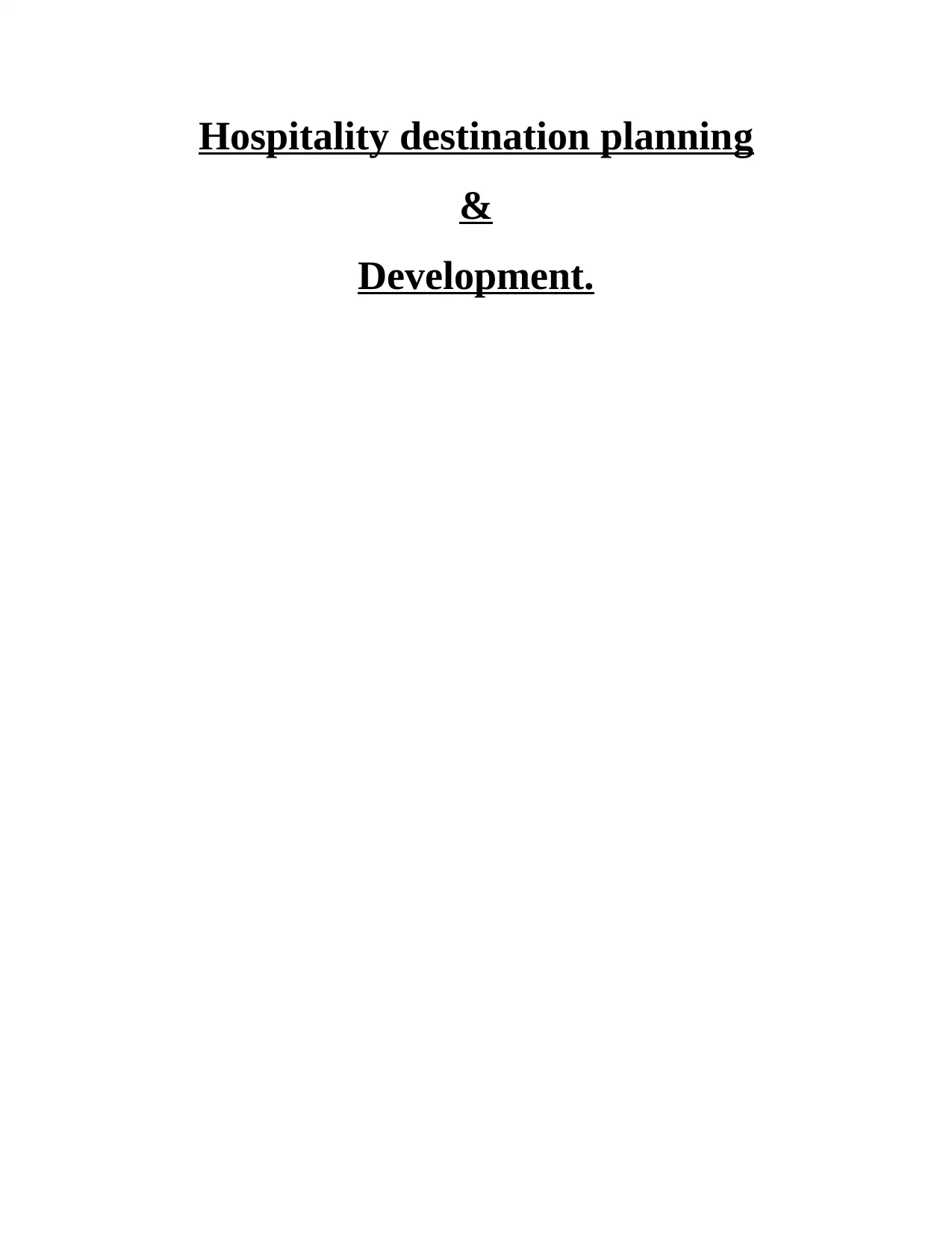
Hospitality destination planning
&
Development.
&
Development.
Paraphrase This Document
Need a fresh take? Get an instant paraphrase of this document with our AI Paraphraser
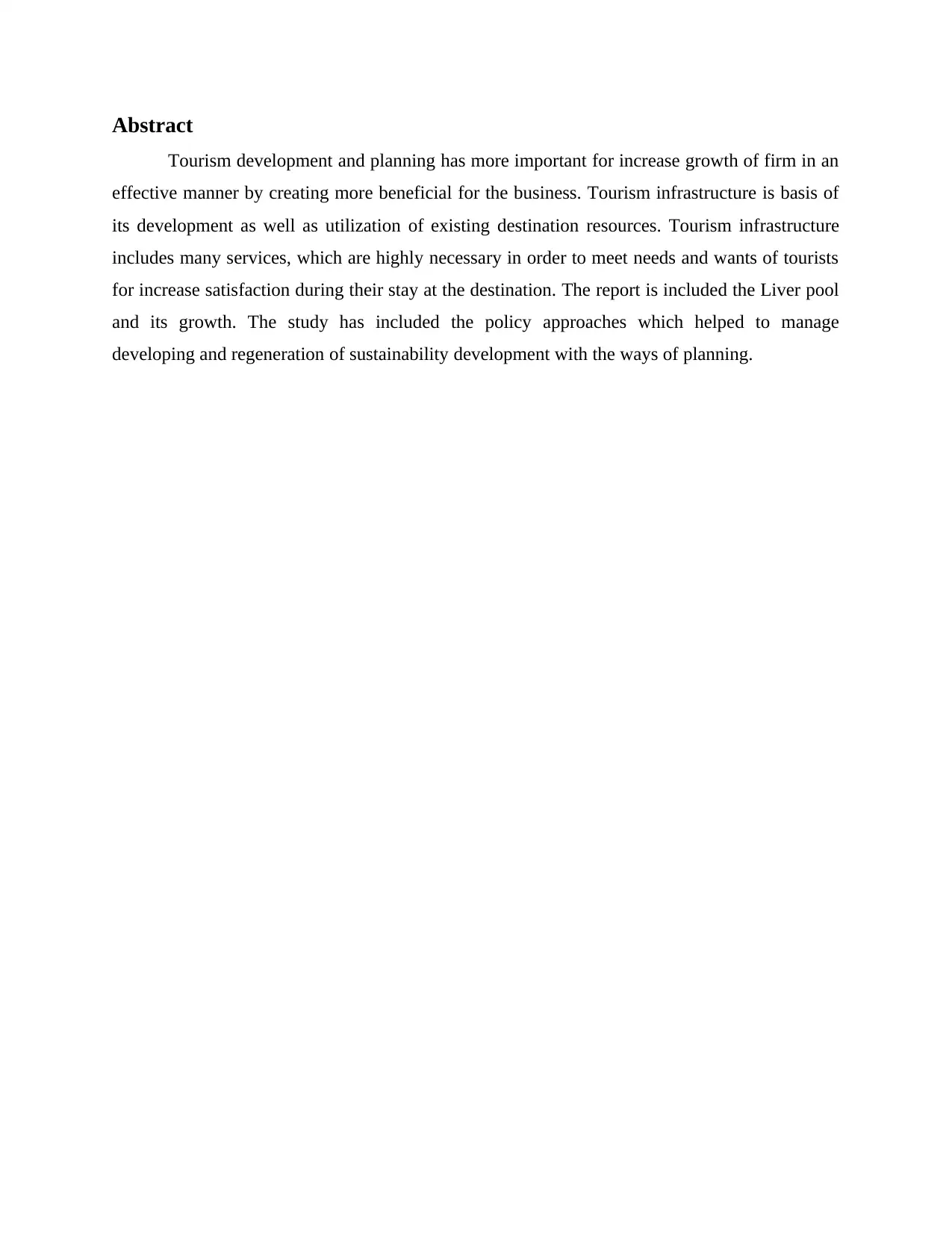
Abstract
Tourism development and planning has more important for increase growth of firm in an
effective manner by creating more beneficial for the business. Tourism infrastructure is basis of
its development as well as utilization of existing destination resources. Tourism infrastructure
includes many services, which are highly necessary in order to meet needs and wants of tourists
for increase satisfaction during their stay at the destination. The report is included the Liver pool
and its growth. The study has included the policy approaches which helped to manage
developing and regeneration of sustainability development with the ways of planning.
Tourism development and planning has more important for increase growth of firm in an
effective manner by creating more beneficial for the business. Tourism infrastructure is basis of
its development as well as utilization of existing destination resources. Tourism infrastructure
includes many services, which are highly necessary in order to meet needs and wants of tourists
for increase satisfaction during their stay at the destination. The report is included the Liver pool
and its growth. The study has included the policy approaches which helped to manage
developing and regeneration of sustainability development with the ways of planning.
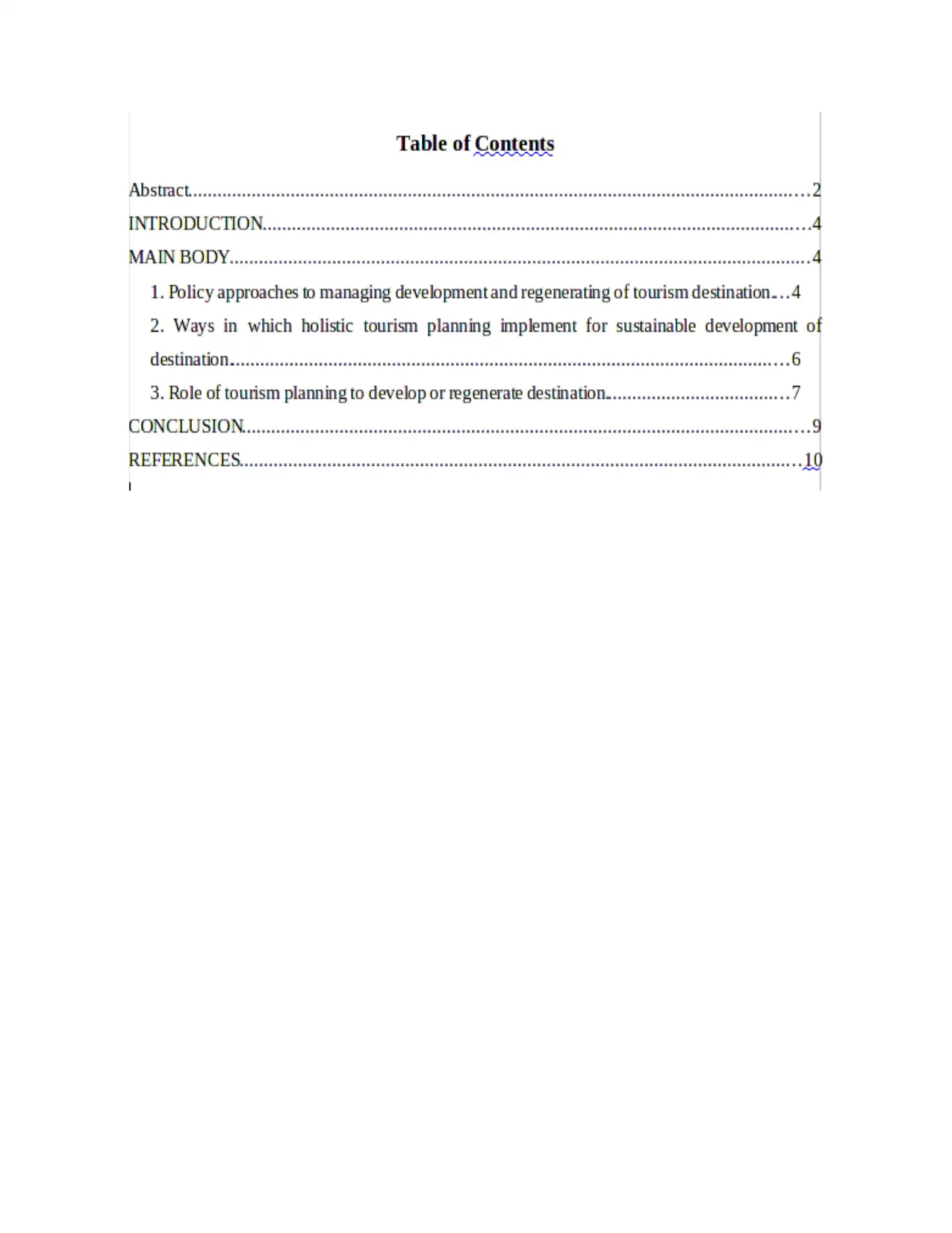
⊘ This is a preview!⊘
Do you want full access?
Subscribe today to unlock all pages.

Trusted by 1+ million students worldwide
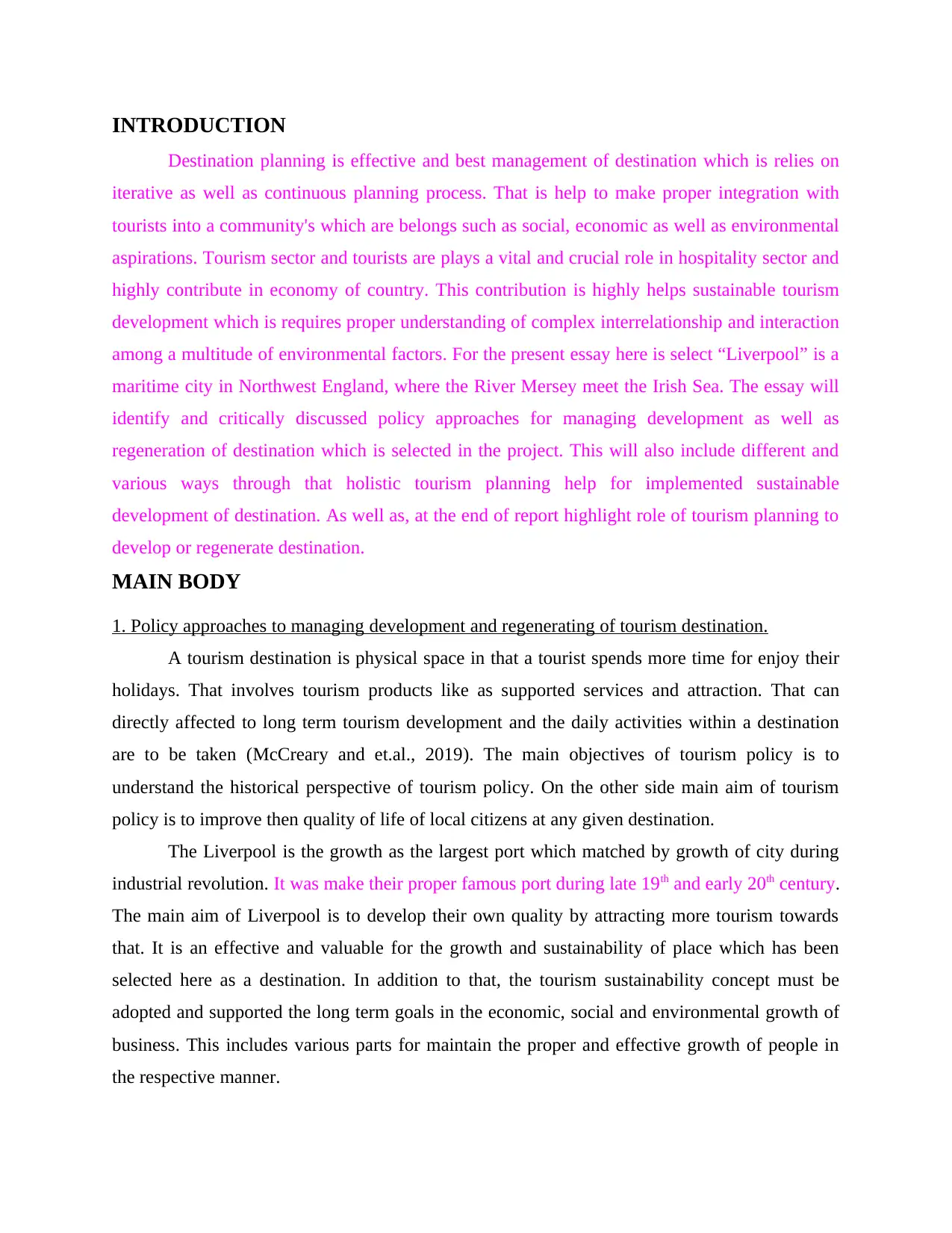
INTRODUCTION
Destination planning is effective and best management of destination which is relies on
iterative as well as continuous planning process. That is help to make proper integration with
tourists into a community's which are belongs such as social, economic as well as environmental
aspirations. Tourism sector and tourists are plays a vital and crucial role in hospitality sector and
highly contribute in economy of country. This contribution is highly helps sustainable tourism
development which is requires proper understanding of complex interrelationship and interaction
among a multitude of environmental factors. For the present essay here is select “Liverpool” is a
maritime city in Northwest England, where the River Mersey meet the Irish Sea. The essay will
identify and critically discussed policy approaches for managing development as well as
regeneration of destination which is selected in the project. This will also include different and
various ways through that holistic tourism planning help for implemented sustainable
development of destination. As well as, at the end of report highlight role of tourism planning to
develop or regenerate destination.
MAIN BODY
1. Policy approaches to managing development and regenerating of tourism destination.
A tourism destination is physical space in that a tourist spends more time for enjoy their
holidays. That involves tourism products like as supported services and attraction. That can
directly affected to long term tourism development and the daily activities within a destination
are to be taken (McCreary and et.al., 2019). The main objectives of tourism policy is to
understand the historical perspective of tourism policy. On the other side main aim of tourism
policy is to improve then quality of life of local citizens at any given destination.
The Liverpool is the growth as the largest port which matched by growth of city during
industrial revolution. It was make their proper famous port during late 19th and early 20th century.
The main aim of Liverpool is to develop their own quality by attracting more tourism towards
that. It is an effective and valuable for the growth and sustainability of place which has been
selected here as a destination. In addition to that, the tourism sustainability concept must be
adopted and supported the long term goals in the economic, social and environmental growth of
business. This includes various parts for maintain the proper and effective growth of people in
the respective manner.
Destination planning is effective and best management of destination which is relies on
iterative as well as continuous planning process. That is help to make proper integration with
tourists into a community's which are belongs such as social, economic as well as environmental
aspirations. Tourism sector and tourists are plays a vital and crucial role in hospitality sector and
highly contribute in economy of country. This contribution is highly helps sustainable tourism
development which is requires proper understanding of complex interrelationship and interaction
among a multitude of environmental factors. For the present essay here is select “Liverpool” is a
maritime city in Northwest England, where the River Mersey meet the Irish Sea. The essay will
identify and critically discussed policy approaches for managing development as well as
regeneration of destination which is selected in the project. This will also include different and
various ways through that holistic tourism planning help for implemented sustainable
development of destination. As well as, at the end of report highlight role of tourism planning to
develop or regenerate destination.
MAIN BODY
1. Policy approaches to managing development and regenerating of tourism destination.
A tourism destination is physical space in that a tourist spends more time for enjoy their
holidays. That involves tourism products like as supported services and attraction. That can
directly affected to long term tourism development and the daily activities within a destination
are to be taken (McCreary and et.al., 2019). The main objectives of tourism policy is to
understand the historical perspective of tourism policy. On the other side main aim of tourism
policy is to improve then quality of life of local citizens at any given destination.
The Liverpool is the growth as the largest port which matched by growth of city during
industrial revolution. It was make their proper famous port during late 19th and early 20th century.
The main aim of Liverpool is to develop their own quality by attracting more tourism towards
that. It is an effective and valuable for the growth and sustainability of place which has been
selected here as a destination. In addition to that, the tourism sustainability concept must be
adopted and supported the long term goals in the economic, social and environmental growth of
business. This includes various parts for maintain the proper and effective growth of people in
the respective manner.
Paraphrase This Document
Need a fresh take? Get an instant paraphrase of this document with our AI Paraphraser
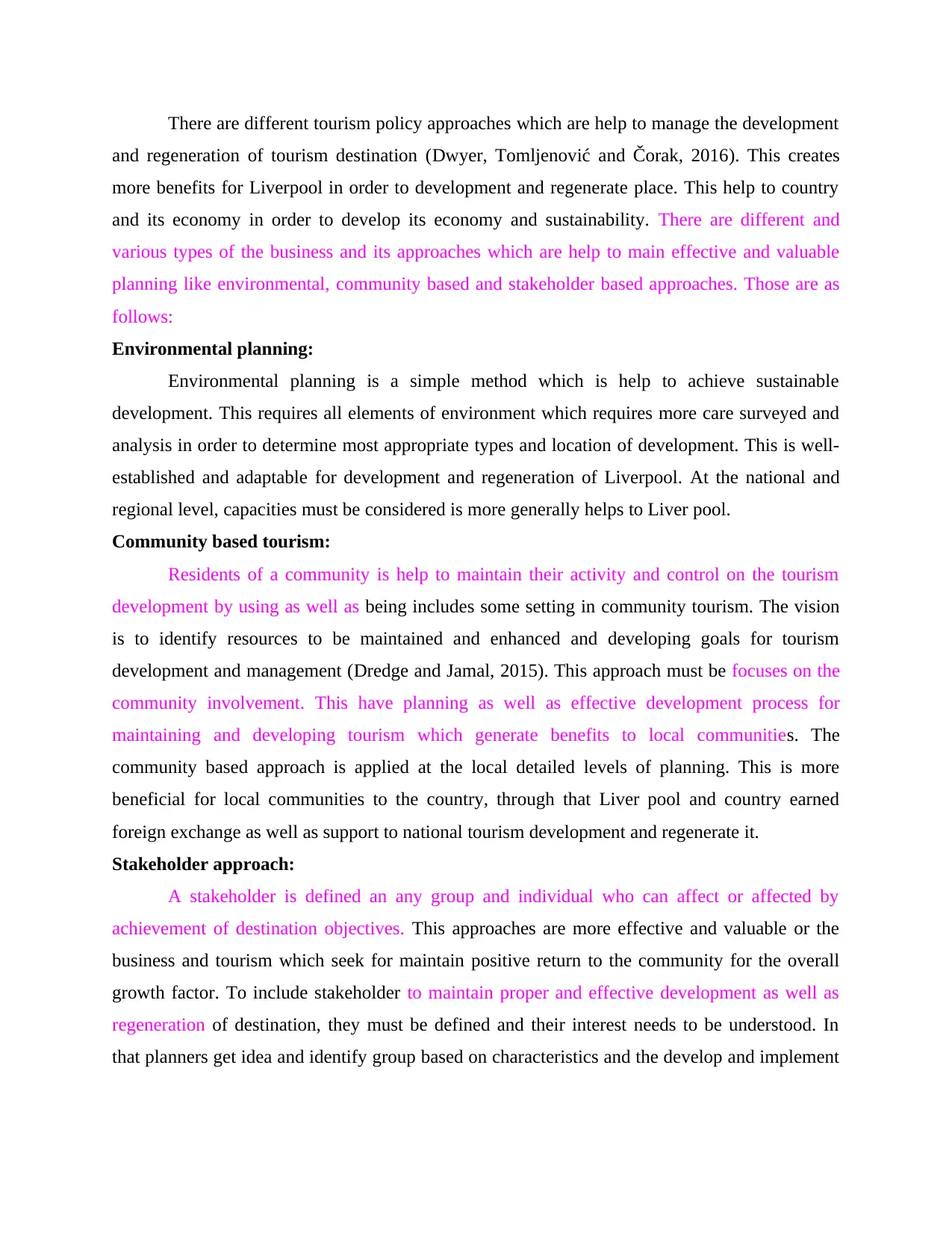
There are different tourism policy approaches which are help to manage the development
and regeneration of tourism destination (Dwyer, Tomljenović and Čorak, 2016). This creates
more benefits for Liverpool in order to development and regenerate place. This help to country
and its economy in order to develop its economy and sustainability. There are different and
various types of the business and its approaches which are help to main effective and valuable
planning like environmental, community based and stakeholder based approaches. Those are as
follows:
Environmental planning:
Environmental planning is a simple method which is help to achieve sustainable
development. This requires all elements of environment which requires more care surveyed and
analysis in order to determine most appropriate types and location of development. This is well-
established and adaptable for development and regeneration of Liverpool. At the national and
regional level, capacities must be considered is more generally helps to Liver pool.
Community based tourism:
Residents of a community is help to maintain their activity and control on the tourism
development by using as well as being includes some setting in community tourism. The vision
is to identify resources to be maintained and enhanced and developing goals for tourism
development and management (Dredge and Jamal, 2015). This approach must be focuses on the
community involvement. This have planning as well as effective development process for
maintaining and developing tourism which generate benefits to local communities. The
community based approach is applied at the local detailed levels of planning. This is more
beneficial for local communities to the country, through that Liver pool and country earned
foreign exchange as well as support to national tourism development and regenerate it.
Stakeholder approach:
A stakeholder is defined an any group and individual who can affect or affected by
achievement of destination objectives. This approaches are more effective and valuable or the
business and tourism which seek for maintain positive return to the community for the overall
growth factor. To include stakeholder to maintain proper and effective development as well as
regeneration of destination, they must be defined and their interest needs to be understood. In
that planners get idea and identify group based on characteristics and the develop and implement
and regeneration of tourism destination (Dwyer, Tomljenović and Čorak, 2016). This creates
more benefits for Liverpool in order to development and regenerate place. This help to country
and its economy in order to develop its economy and sustainability. There are different and
various types of the business and its approaches which are help to main effective and valuable
planning like environmental, community based and stakeholder based approaches. Those are as
follows:
Environmental planning:
Environmental planning is a simple method which is help to achieve sustainable
development. This requires all elements of environment which requires more care surveyed and
analysis in order to determine most appropriate types and location of development. This is well-
established and adaptable for development and regeneration of Liverpool. At the national and
regional level, capacities must be considered is more generally helps to Liver pool.
Community based tourism:
Residents of a community is help to maintain their activity and control on the tourism
development by using as well as being includes some setting in community tourism. The vision
is to identify resources to be maintained and enhanced and developing goals for tourism
development and management (Dredge and Jamal, 2015). This approach must be focuses on the
community involvement. This have planning as well as effective development process for
maintaining and developing tourism which generate benefits to local communities. The
community based approach is applied at the local detailed levels of planning. This is more
beneficial for local communities to the country, through that Liver pool and country earned
foreign exchange as well as support to national tourism development and regenerate it.
Stakeholder approach:
A stakeholder is defined an any group and individual who can affect or affected by
achievement of destination objectives. This approaches are more effective and valuable or the
business and tourism which seek for maintain positive return to the community for the overall
growth factor. To include stakeholder to maintain proper and effective development as well as
regeneration of destination, they must be defined and their interest needs to be understood. In
that planners get idea and identify group based on characteristics and the develop and implement
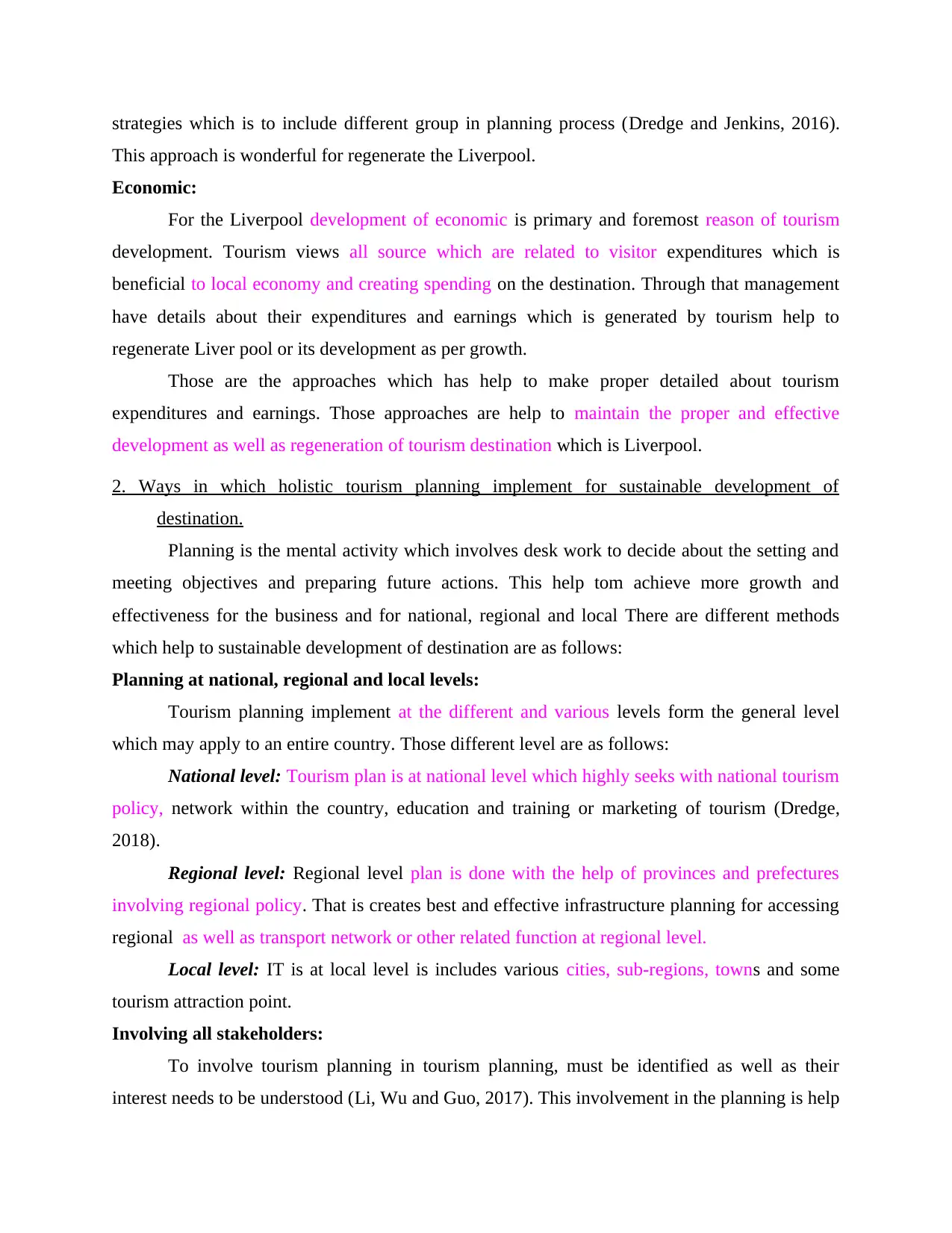
strategies which is to include different group in planning process (Dredge and Jenkins, 2016).
This approach is wonderful for regenerate the Liverpool.
Economic:
For the Liverpool development of economic is primary and foremost reason of tourism
development. Tourism views all source which are related to visitor expenditures which is
beneficial to local economy and creating spending on the destination. Through that management
have details about their expenditures and earnings which is generated by tourism help to
regenerate Liver pool or its development as per growth.
Those are the approaches which has help to make proper detailed about tourism
expenditures and earnings. Those approaches are help to maintain the proper and effective
development as well as regeneration of tourism destination which is Liverpool.
2. Ways in which holistic tourism planning implement for sustainable development of
destination.
Planning is the mental activity which involves desk work to decide about the setting and
meeting objectives and preparing future actions. This help tom achieve more growth and
effectiveness for the business and for national, regional and local There are different methods
which help to sustainable development of destination are as follows:
Planning at national, regional and local levels:
Tourism planning implement at the different and various levels form the general level
which may apply to an entire country. Those different level are as follows:
National level: Tourism plan is at national level which highly seeks with national tourism
policy, network within the country, education and training or marketing of tourism (Dredge,
2018).
Regional level: Regional level plan is done with the help of provinces and prefectures
involving regional policy. That is creates best and effective infrastructure planning for accessing
regional as well as transport network or other related function at regional level.
Local level: IT is at local level is includes various cities, sub-regions, towns and some
tourism attraction point.
Involving all stakeholders:
To involve tourism planning in tourism planning, must be identified as well as their
interest needs to be understood (Li, Wu and Guo, 2017). This involvement in the planning is help
This approach is wonderful for regenerate the Liverpool.
Economic:
For the Liverpool development of economic is primary and foremost reason of tourism
development. Tourism views all source which are related to visitor expenditures which is
beneficial to local economy and creating spending on the destination. Through that management
have details about their expenditures and earnings which is generated by tourism help to
regenerate Liver pool or its development as per growth.
Those are the approaches which has help to make proper detailed about tourism
expenditures and earnings. Those approaches are help to maintain the proper and effective
development as well as regeneration of tourism destination which is Liverpool.
2. Ways in which holistic tourism planning implement for sustainable development of
destination.
Planning is the mental activity which involves desk work to decide about the setting and
meeting objectives and preparing future actions. This help tom achieve more growth and
effectiveness for the business and for national, regional and local There are different methods
which help to sustainable development of destination are as follows:
Planning at national, regional and local levels:
Tourism planning implement at the different and various levels form the general level
which may apply to an entire country. Those different level are as follows:
National level: Tourism plan is at national level which highly seeks with national tourism
policy, network within the country, education and training or marketing of tourism (Dredge,
2018).
Regional level: Regional level plan is done with the help of provinces and prefectures
involving regional policy. That is creates best and effective infrastructure planning for accessing
regional as well as transport network or other related function at regional level.
Local level: IT is at local level is includes various cities, sub-regions, towns and some
tourism attraction point.
Involving all stakeholders:
To involve tourism planning in tourism planning, must be identified as well as their
interest needs to be understood (Li, Wu and Guo, 2017). This involvement in the planning is help
⊘ This is a preview!⊘
Do you want full access?
Subscribe today to unlock all pages.

Trusted by 1+ million students worldwide
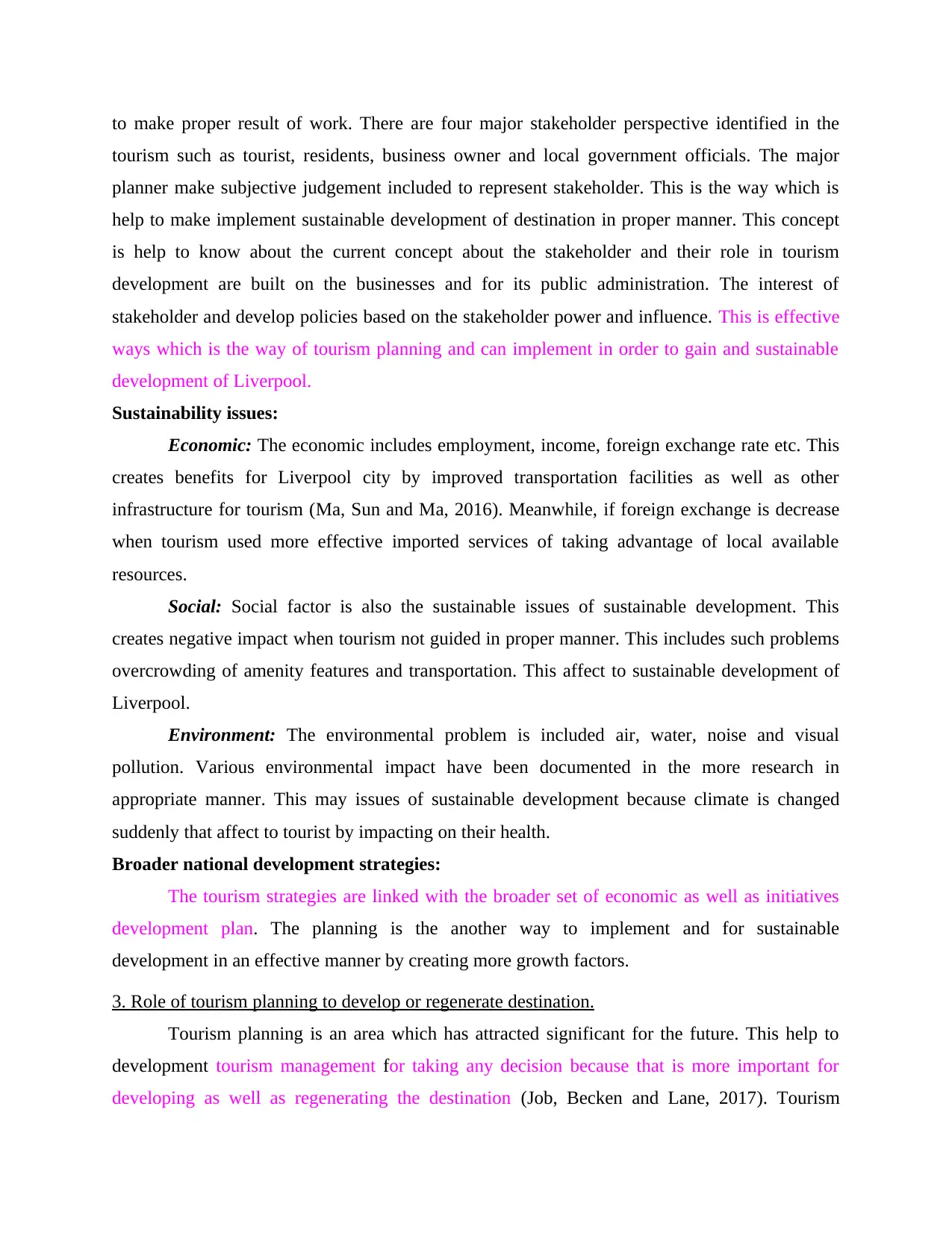
to make proper result of work. There are four major stakeholder perspective identified in the
tourism such as tourist, residents, business owner and local government officials. The major
planner make subjective judgement included to represent stakeholder. This is the way which is
help to make implement sustainable development of destination in proper manner. This concept
is help to know about the current concept about the stakeholder and their role in tourism
development are built on the businesses and for its public administration. The interest of
stakeholder and develop policies based on the stakeholder power and influence. This is effective
ways which is the way of tourism planning and can implement in order to gain and sustainable
development of Liverpool.
Sustainability issues:
Economic: The economic includes employment, income, foreign exchange rate etc. This
creates benefits for Liverpool city by improved transportation facilities as well as other
infrastructure for tourism (Ma, Sun and Ma, 2016). Meanwhile, if foreign exchange is decrease
when tourism used more effective imported services of taking advantage of local available
resources.
Social: Social factor is also the sustainable issues of sustainable development. This
creates negative impact when tourism not guided in proper manner. This includes such problems
overcrowding of amenity features and transportation. This affect to sustainable development of
Liverpool.
Environment: The environmental problem is included air, water, noise and visual
pollution. Various environmental impact have been documented in the more research in
appropriate manner. This may issues of sustainable development because climate is changed
suddenly that affect to tourist by impacting on their health.
Broader national development strategies:
The tourism strategies are linked with the broader set of economic as well as initiatives
development plan. The planning is the another way to implement and for sustainable
development in an effective manner by creating more growth factors.
3. Role of tourism planning to develop or regenerate destination.
Tourism planning is an area which has attracted significant for the future. This help to
development tourism management for taking any decision because that is more important for
developing as well as regenerating the destination (Job, Becken and Lane, 2017). Tourism
tourism such as tourist, residents, business owner and local government officials. The major
planner make subjective judgement included to represent stakeholder. This is the way which is
help to make implement sustainable development of destination in proper manner. This concept
is help to know about the current concept about the stakeholder and their role in tourism
development are built on the businesses and for its public administration. The interest of
stakeholder and develop policies based on the stakeholder power and influence. This is effective
ways which is the way of tourism planning and can implement in order to gain and sustainable
development of Liverpool.
Sustainability issues:
Economic: The economic includes employment, income, foreign exchange rate etc. This
creates benefits for Liverpool city by improved transportation facilities as well as other
infrastructure for tourism (Ma, Sun and Ma, 2016). Meanwhile, if foreign exchange is decrease
when tourism used more effective imported services of taking advantage of local available
resources.
Social: Social factor is also the sustainable issues of sustainable development. This
creates negative impact when tourism not guided in proper manner. This includes such problems
overcrowding of amenity features and transportation. This affect to sustainable development of
Liverpool.
Environment: The environmental problem is included air, water, noise and visual
pollution. Various environmental impact have been documented in the more research in
appropriate manner. This may issues of sustainable development because climate is changed
suddenly that affect to tourist by impacting on their health.
Broader national development strategies:
The tourism strategies are linked with the broader set of economic as well as initiatives
development plan. The planning is the another way to implement and for sustainable
development in an effective manner by creating more growth factors.
3. Role of tourism planning to develop or regenerate destination.
Tourism planning is an area which has attracted significant for the future. This help to
development tourism management for taking any decision because that is more important for
developing as well as regenerating the destination (Job, Becken and Lane, 2017). Tourism
Paraphrase This Document
Need a fresh take? Get an instant paraphrase of this document with our AI Paraphraser
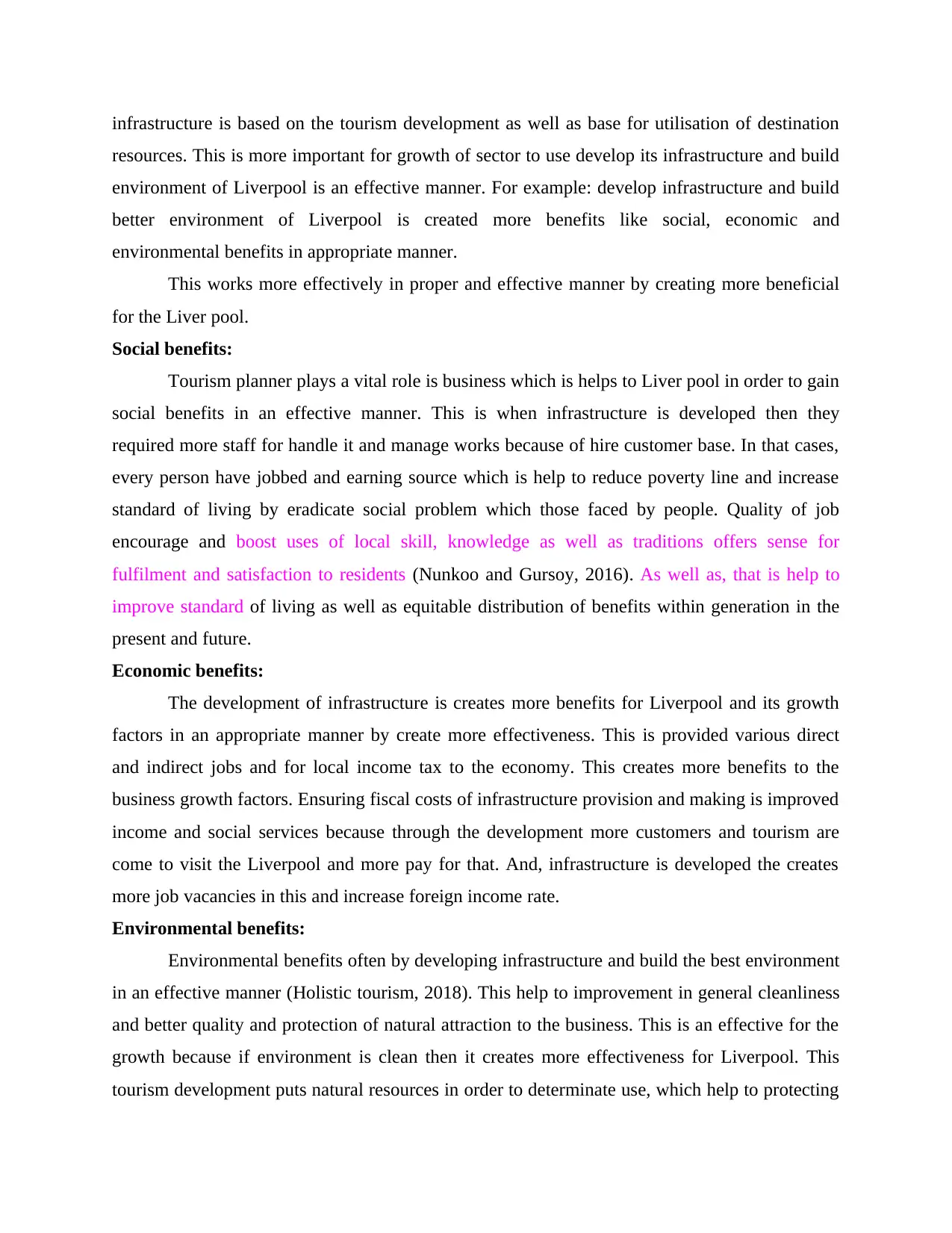
infrastructure is based on the tourism development as well as base for utilisation of destination
resources. This is more important for growth of sector to use develop its infrastructure and build
environment of Liverpool is an effective manner. For example: develop infrastructure and build
better environment of Liverpool is created more benefits like social, economic and
environmental benefits in appropriate manner.
This works more effectively in proper and effective manner by creating more beneficial
for the Liver pool.
Social benefits:
Tourism planner plays a vital role is business which is helps to Liver pool in order to gain
social benefits in an effective manner. This is when infrastructure is developed then they
required more staff for handle it and manage works because of hire customer base. In that cases,
every person have jobbed and earning source which is help to reduce poverty line and increase
standard of living by eradicate social problem which those faced by people. Quality of job
encourage and boost uses of local skill, knowledge as well as traditions offers sense for
fulfilment and satisfaction to residents (Nunkoo and Gursoy, 2016). As well as, that is help to
improve standard of living as well as equitable distribution of benefits within generation in the
present and future.
Economic benefits:
The development of infrastructure is creates more benefits for Liverpool and its growth
factors in an appropriate manner by create more effectiveness. This is provided various direct
and indirect jobs and for local income tax to the economy. This creates more benefits to the
business growth factors. Ensuring fiscal costs of infrastructure provision and making is improved
income and social services because through the development more customers and tourism are
come to visit the Liverpool and more pay for that. And, infrastructure is developed the creates
more job vacancies in this and increase foreign income rate.
Environmental benefits:
Environmental benefits often by developing infrastructure and build the best environment
in an effective manner (Holistic tourism, 2018). This help to improvement in general cleanliness
and better quality and protection of natural attraction to the business. This is an effective for the
growth because if environment is clean then it creates more effectiveness for Liverpool. This
tourism development puts natural resources in order to determinate use, which help to protecting
resources. This is more important for growth of sector to use develop its infrastructure and build
environment of Liverpool is an effective manner. For example: develop infrastructure and build
better environment of Liverpool is created more benefits like social, economic and
environmental benefits in appropriate manner.
This works more effectively in proper and effective manner by creating more beneficial
for the Liver pool.
Social benefits:
Tourism planner plays a vital role is business which is helps to Liver pool in order to gain
social benefits in an effective manner. This is when infrastructure is developed then they
required more staff for handle it and manage works because of hire customer base. In that cases,
every person have jobbed and earning source which is help to reduce poverty line and increase
standard of living by eradicate social problem which those faced by people. Quality of job
encourage and boost uses of local skill, knowledge as well as traditions offers sense for
fulfilment and satisfaction to residents (Nunkoo and Gursoy, 2016). As well as, that is help to
improve standard of living as well as equitable distribution of benefits within generation in the
present and future.
Economic benefits:
The development of infrastructure is creates more benefits for Liverpool and its growth
factors in an appropriate manner by create more effectiveness. This is provided various direct
and indirect jobs and for local income tax to the economy. This creates more benefits to the
business growth factors. Ensuring fiscal costs of infrastructure provision and making is improved
income and social services because through the development more customers and tourism are
come to visit the Liverpool and more pay for that. And, infrastructure is developed the creates
more job vacancies in this and increase foreign income rate.
Environmental benefits:
Environmental benefits often by developing infrastructure and build the best environment
in an effective manner (Holistic tourism, 2018). This help to improvement in general cleanliness
and better quality and protection of natural attraction to the business. This is an effective for the
growth because if environment is clean then it creates more effectiveness for Liverpool. This
tourism development puts natural resources in order to determinate use, which help to protecting
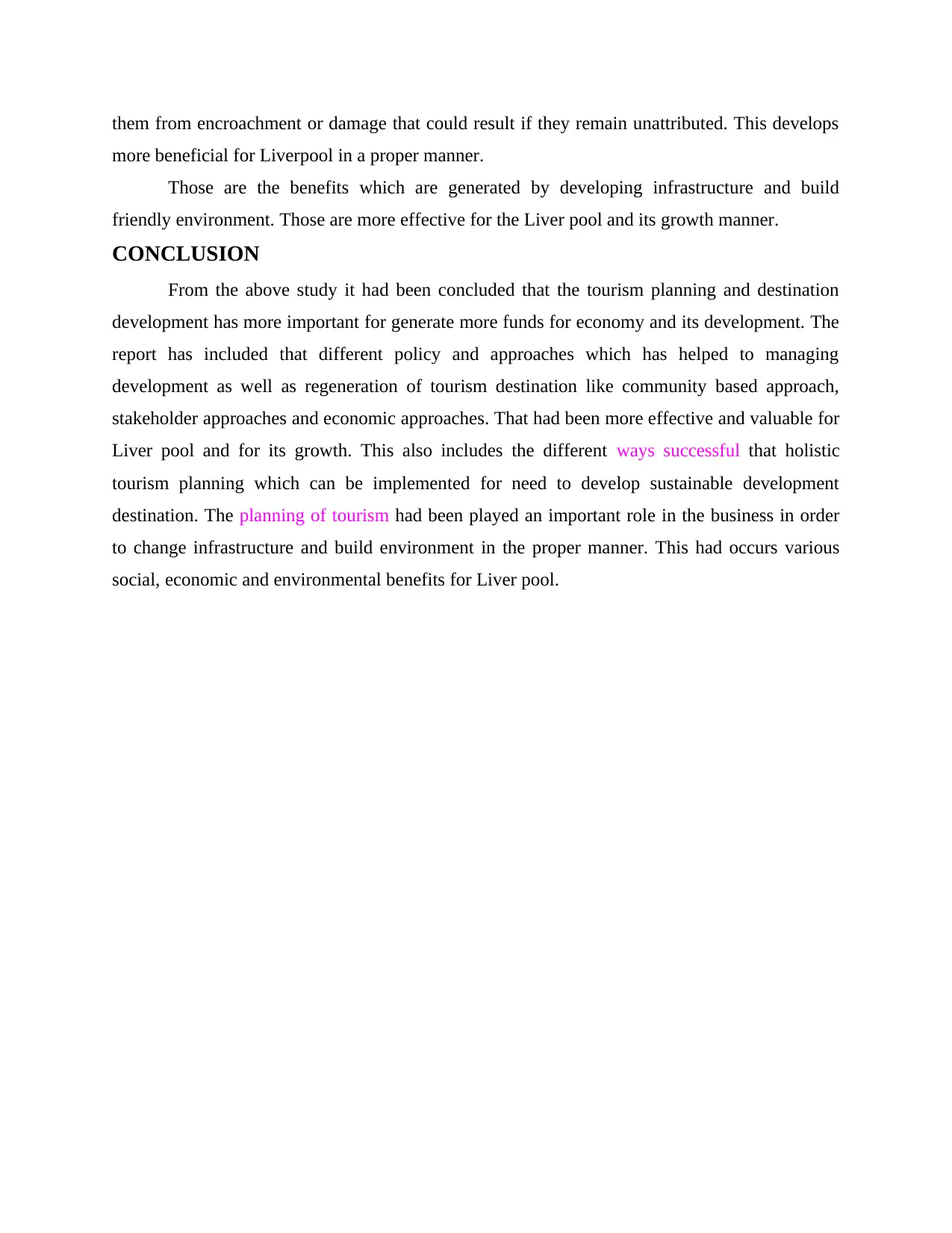
them from encroachment or damage that could result if they remain unattributed. This develops
more beneficial for Liverpool in a proper manner.
Those are the benefits which are generated by developing infrastructure and build
friendly environment. Those are more effective for the Liver pool and its growth manner.
CONCLUSION
From the above study it had been concluded that the tourism planning and destination
development has more important for generate more funds for economy and its development. The
report has included that different policy and approaches which has helped to managing
development as well as regeneration of tourism destination like community based approach,
stakeholder approaches and economic approaches. That had been more effective and valuable for
Liver pool and for its growth. This also includes the different ways successful that holistic
tourism planning which can be implemented for need to develop sustainable development
destination. The planning of tourism had been played an important role in the business in order
to change infrastructure and build environment in the proper manner. This had occurs various
social, economic and environmental benefits for Liver pool.
more beneficial for Liverpool in a proper manner.
Those are the benefits which are generated by developing infrastructure and build
friendly environment. Those are more effective for the Liver pool and its growth manner.
CONCLUSION
From the above study it had been concluded that the tourism planning and destination
development has more important for generate more funds for economy and its development. The
report has included that different policy and approaches which has helped to managing
development as well as regeneration of tourism destination like community based approach,
stakeholder approaches and economic approaches. That had been more effective and valuable for
Liver pool and for its growth. This also includes the different ways successful that holistic
tourism planning which can be implemented for need to develop sustainable development
destination. The planning of tourism had been played an important role in the business in order
to change infrastructure and build environment in the proper manner. This had occurs various
social, economic and environmental benefits for Liver pool.
⊘ This is a preview!⊘
Do you want full access?
Subscribe today to unlock all pages.

Trusted by 1+ million students worldwide
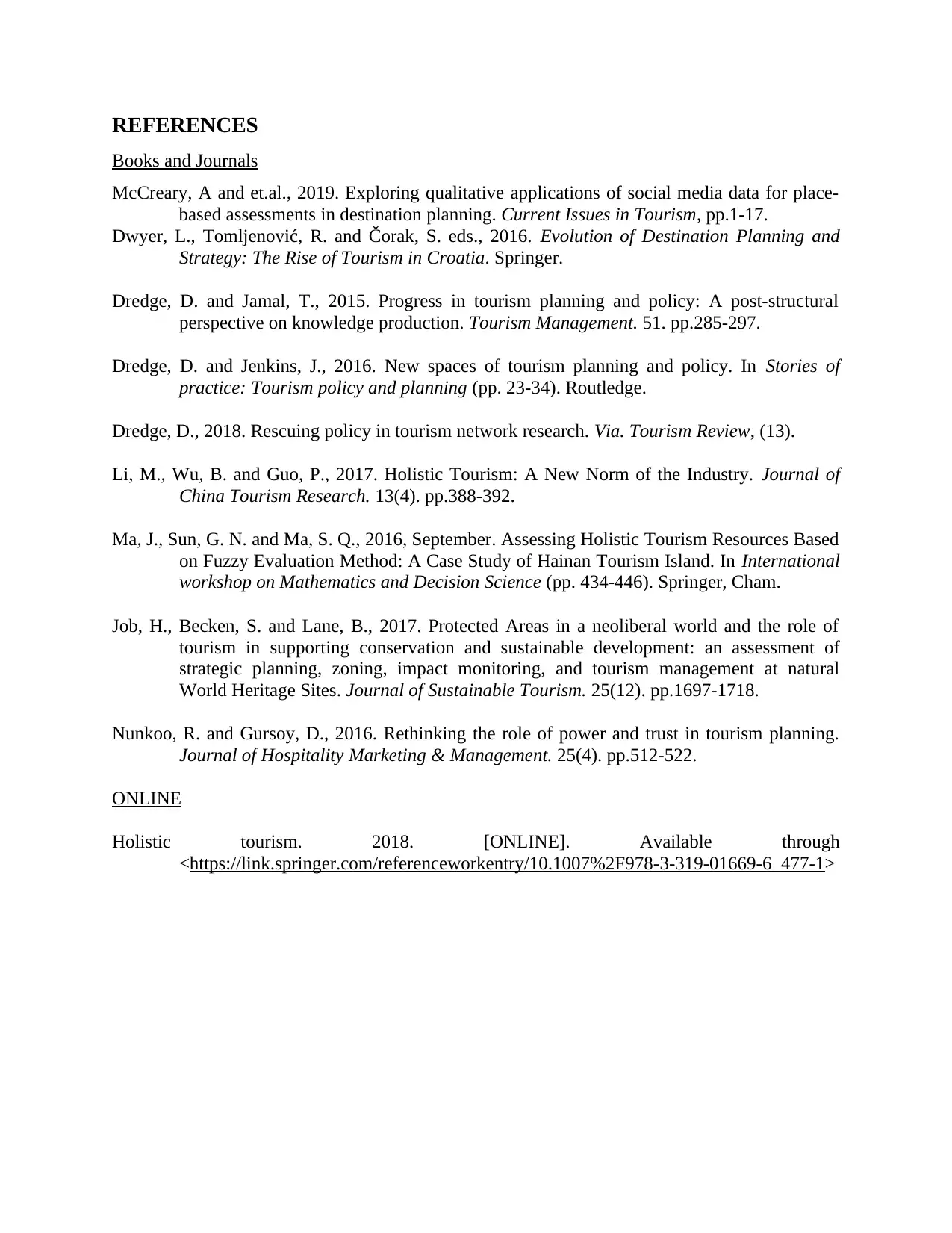
REFERENCES
Books and Journals
McCreary, A and et.al., 2019. Exploring qualitative applications of social media data for place-
based assessments in destination planning. Current Issues in Tourism, pp.1-17.
Dwyer, L., Tomljenović, R. and Čorak, S. eds., 2016. Evolution of Destination Planning and
Strategy: The Rise of Tourism in Croatia. Springer.
Dredge, D. and Jamal, T., 2015. Progress in tourism planning and policy: A post-structural
perspective on knowledge production. Tourism Management. 51. pp.285-297.
Dredge, D. and Jenkins, J., 2016. New spaces of tourism planning and policy. In Stories of
practice: Tourism policy and planning (pp. 23-34). Routledge.
Dredge, D., 2018. Rescuing policy in tourism network research. Via. Tourism Review, (13).
Li, M., Wu, B. and Guo, P., 2017. Holistic Tourism: A New Norm of the Industry. Journal of
China Tourism Research. 13(4). pp.388-392.
Ma, J., Sun, G. N. and Ma, S. Q., 2016, September. Assessing Holistic Tourism Resources Based
on Fuzzy Evaluation Method: A Case Study of Hainan Tourism Island. In International
workshop on Mathematics and Decision Science (pp. 434-446). Springer, Cham.
Job, H., Becken, S. and Lane, B., 2017. Protected Areas in a neoliberal world and the role of
tourism in supporting conservation and sustainable development: an assessment of
strategic planning, zoning, impact monitoring, and tourism management at natural
World Heritage Sites. Journal of Sustainable Tourism. 25(12). pp.1697-1718.
Nunkoo, R. and Gursoy, D., 2016. Rethinking the role of power and trust in tourism planning.
Journal of Hospitality Marketing & Management. 25(4). pp.512-522.
ONLINE
Holistic tourism. 2018. [ONLINE]. Available through
<https://link.springer.com/referenceworkentry/10.1007%2F978-3-319-01669-6_477-1>
Books and Journals
McCreary, A and et.al., 2019. Exploring qualitative applications of social media data for place-
based assessments in destination planning. Current Issues in Tourism, pp.1-17.
Dwyer, L., Tomljenović, R. and Čorak, S. eds., 2016. Evolution of Destination Planning and
Strategy: The Rise of Tourism in Croatia. Springer.
Dredge, D. and Jamal, T., 2015. Progress in tourism planning and policy: A post-structural
perspective on knowledge production. Tourism Management. 51. pp.285-297.
Dredge, D. and Jenkins, J., 2016. New spaces of tourism planning and policy. In Stories of
practice: Tourism policy and planning (pp. 23-34). Routledge.
Dredge, D., 2018. Rescuing policy in tourism network research. Via. Tourism Review, (13).
Li, M., Wu, B. and Guo, P., 2017. Holistic Tourism: A New Norm of the Industry. Journal of
China Tourism Research. 13(4). pp.388-392.
Ma, J., Sun, G. N. and Ma, S. Q., 2016, September. Assessing Holistic Tourism Resources Based
on Fuzzy Evaluation Method: A Case Study of Hainan Tourism Island. In International
workshop on Mathematics and Decision Science (pp. 434-446). Springer, Cham.
Job, H., Becken, S. and Lane, B., 2017. Protected Areas in a neoliberal world and the role of
tourism in supporting conservation and sustainable development: an assessment of
strategic planning, zoning, impact monitoring, and tourism management at natural
World Heritage Sites. Journal of Sustainable Tourism. 25(12). pp.1697-1718.
Nunkoo, R. and Gursoy, D., 2016. Rethinking the role of power and trust in tourism planning.
Journal of Hospitality Marketing & Management. 25(4). pp.512-522.
ONLINE
Holistic tourism. 2018. [ONLINE]. Available through
<https://link.springer.com/referenceworkentry/10.1007%2F978-3-319-01669-6_477-1>
1 out of 10
Related Documents
Your All-in-One AI-Powered Toolkit for Academic Success.
+13062052269
info@desklib.com
Available 24*7 on WhatsApp / Email
![[object Object]](/_next/static/media/star-bottom.7253800d.svg)
Unlock your academic potential
Copyright © 2020–2026 A2Z Services. All Rights Reserved. Developed and managed by ZUCOL.





